 |
 |
| |
|
|
| |
|
|
| |
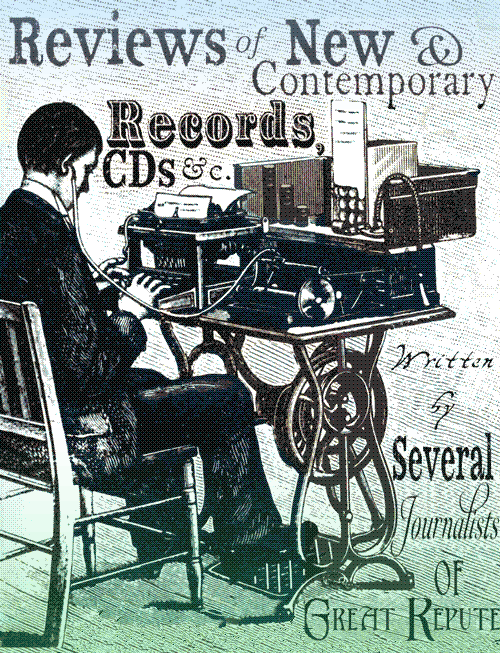 |
|
| =
May 2021 = |
|
|
| |
| Loner Deluxe |
| Samsara Blues
Experiment |
| D. Rothon |
| Kimberley Rew
and Lee Cave Berry |
| Mark
and the Clouds |
| Beld |
| Phurpa & Queen
Elephantine |
| Don
Rendell & Ian Carr |
| Gnod |
| Papir |
| |
| |
| |
| |
| |
| |
| |
| |
| |
| |
| |
| |
|
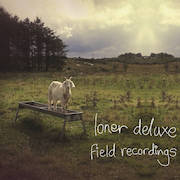
|
LONER
DELUXE – FIELD RECORDINGS
(Field
Recordings | Loner Deluxe | Rusted Rail
(bandcamp.com) )
Mainly
the
work of Rusted Rail boss Keith Wallace, with the
help of Cecilia Danell and Brian Kelly, this
album is a delightful musical ramble that is
inspired by lo-fi rather than being lo-fi, the
music changing mood at a whim, always something
new to delight the ear as the journey continues.
Opening with the excellently titled
“Track 1 Side1”, you are instantly dragged in by
a warm beat and electronics before an acoustic
guitar and lovely pop vocals join the welcome,
the throwaway yet perfect lyrics adding another
layer before things get slightly heavier with a
fine guitar solo that cuts through everything,
the tune reminding me of The Pigeons blended
with Pavement, a touch of Ant Bee thrown in for
good measure. Next up, “Off the Grid” is a
stoned Sunday afternoon instrumental, a lazy
drum/bass groove overlaid with rippling guitar
and buzzing electronics, the same atmosphere
apparent in “Tin Foil Hat” although vocals and a
Hohner Organetta, played by David Colohan, turn
the tune into a strange mix of wobbly folk and
the Pet Shop Boys.
I guess this opening salvo is a great
introduction to the rest of the album, the
music, playful, intriguing and never dull, the
use of some well imagined electronic beats
adding energy and purpose to the
proceedings especially on the low groove of
“Gone Fission”, a track that gets the head
nodding with its repetitive ambience or indeed
on “Mist Calls” which somehow reminds me of Phil
Spector although I am not sure why.
Elsewhere, “Ex Directory” starts off
with the promise of a Black Sabbath inspired
riff before morphing into a version of “Down
Down” heard in a dream, fabulous stuff and a
personal favourite. Sounding like an obscure 4AD
band “Space Junk” also hits the spot, a sweet
bath filled with electronics, soft vocals and a
chiming banjo, just climb right in and relax.
Within
the
context of this album “Viral Hit” could be seen
as an epic song, soaring chords and vocals
embellished with banjo and distorted guitar
creating a great finale that leads back out to
the real world. Saving the best until last, at
least in this review “Cancel the Fear” has the
the feel of early Beck, lo-fi hip hop beats and
droning instruments the perfect background for
the lyrical delivery, possibly the strongest
song on a collection filled with quality tunes,
perfect for lazy afternoons in the garden or,
indeed, any other moment.
(Simon
Lewis)
|
|
|
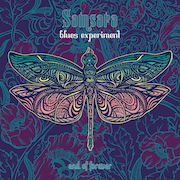
|
SAMSARA
BLUES EXPERIMENT – END OF FOREVER
(Electric Magic)
German prog/psych/stoner masters Samsara
Blues Experiment bring us this terrific fifth
album, which unfortunately could be their last,
as they’ve announced they’re going on indefinite
hiatus. Pity,
that, because they’ve been putting out
consistently outstanding music since 2010’s
‘Long Distance Trip.’
Christian Peters (guitar, keyboards,
vocals), Hans Elselt (bass, backing vocals), and
Thomas Vedder (drums) truly give it their all,
and if this is it, they’re surely riding off
into the sunset on top.
The album’s six lengthy and curvy tracks
over 46 minutes offer up plenty of Christian
Peters’ (aka Surya Kris Peters in his solo and
other endeavors) heavy, distorted and
multi-pedaled guitar over a Mellotron, synths,
and more Mellotron, a formula in which, for me,
alas all resistance is futile.
I surrender, I surrender.
Opening with the eleven-minute “Second
Birth,” SBE lets loose virtually all the arrows
in their considerable quiver.
There are long, pastoral, proggy
passages, heavy stoner grooves, and, when he
feels good and ready several minutes in, a
conventional song by Peters.
Elselt on bass and Vedder on drums lean
in heavily, and are a mighty force on rhythm.
Their style reminds me slightly of late
model Opeth, and Peters’ voice has some
similarities to Mikael Åkerfeldt;
and also of early 70s Jethro Tull, if Ian
Anderson had accidentally left his flute in the
taxi cab. The
band is highly appreciated by metal fans, but
when Samsara Blues Experiment rocks, it’s more
what I’d call hard rock than metal.
The fellas also get their Santana on
with another corker, “Southern Sunset,” with
Vedder laying down a jungle-like beat on the
toms, and Peters raving on organ and guitar.
As perhaps with the band’s situation,
towards the album’s end the songs deal with loss
and things coming to a hopeless and meaningless
end. Case
in point, the eight-minute title track, with
Peters singing “All the bits and pieces of a
long gone past/lie shattered to my feet while I
got nothing in my hands/For all I wished my life
would ever be/I only learned the good things
weren’t made to last.”
Peters punctuates his dolorous message
with a stinging guitar solo.
This is followed by the melancholy
“Orchid Annie.”
Peters concludes his lament of the loss
of Annie with “Now that the dream is over and I
wander all around/I cannot rest my head to see
what life is all about/It’s not an endless
story, my thoughts are full of doubt/The
memories won’t relieve me.”
Between verses, Peters alternates between
solos on scorching guitar, organ and synths.
Bonus instrumental track “Jumbo Mumbo
Jumbo” is a highly enjoyable ride.
Catalan flavored, with giant Mellotron
sound over some phenomenal guitar by Peters,
this is the sort of thing that shows you Samsara
Blues Experiment’s innate greatness.
This stunner that’s a “bonus track” could
be the best on plenty of other records.
It will be heartbreaking if End of
Forever is the last offering from Samsara Blues
Experiment. They’re
one band who give 100% every time.
Not a single note is wasted, and theirs
is a style you can slip into a moment after
hitting play and think, ahh yes, this’ll do
quite nicely, keep it coming please.
(Mark
Feingold)
|
|
|
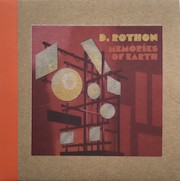 |
D
ROTHON – MEMORIES
OF EARTH
Claypipe
Records
www.claypipemusic.com
700 numbered vinyl copies.
Following
on from his last release for Claypipe in 2018
Nightscapes, David is back and this time it is
with an album which takes its theme as Space and
in particular it was inspired by Moving To Mars
an exhibition at London’s Design Museum in 2019
and also by David’s fascination with all things
outer space, from a young age.
Again
it is mainly instrumental, with a couple of
vocal contributions from Johanna Warren and
Claudia Barton. Consisting of ten tracks, which
draw on many influences, including a little
prog, electronica, lounge and European
soundtracks. The album opens with ‘Apeman,
Spaceman’ a string odyssey with drifting ambient
steel and tinkling piano notes over a woozy bed
of electronica. ‘Cybernetics Serendipity’,
follows a fine track with drums and organ and
whirring electronica, it sounds very much like
Pink Floyd did in the mid seventies, it’s also
embellished with what very much sounds like a
Stylophone solo. So here’s a good one ‘Eight
Million Miles High’ is very cool dropping in a
few motifs from the song from which inspired it
‘Eight Miles High’ by The Byrds. This song has
some lovely Mellotron wheezing throughout; it’s
light, melodic and jazzy with some fine arpeggio
electric guitar passages.
‘Aquarius
Rising’ starts with organ notes overlaid with
some excellent drifting pedal steel guitar
notes, which hang like dust motes in the air. As
the song progresses it is suffused with wordless
vocals. ‘West Of The Moon’, sounds again like a
Pink Floyd out-take circa Wish You Were Here.
‘The Stars Below Us’ has a light motorik groove,
which acts as a bedrock for all manner of
electronic instruments to twinkle over. ‘The
Ghosts We Bring’, is
a haunting slice of electronica with a few
mournful bursts of trumpet. ‘The Spaces
Between’, orbits very slowly, electric guitar
notes are dropped softly over a bed of ambient
steel guitar, while a faint motorik groove is
established. ‘Further From Home’, has a lovely
wistful melody played on chromatic harmonica,
which makes it sound like Morricone in space.
The album ends with the title track ‘Memories
From Earth’ a paean to Earth and its deep, wet
blue mysteries.
With words written by Claudia Barton who
adds suitably unearthly vocals over a bed of
electronica, strings and trumpet, with a melody
like a more subdued Aqua Marina, it ends with a
few bursts of birdsong. This album shows what a
versatile musician David is, and as much as I
loved Nightscapes, this one for me is the
stronger of the two. I can’t wait to hear what
he does next. It will of course sell out with
pre orders taken in a couple of week’s time.
(Andrew
Young)
|
|
|
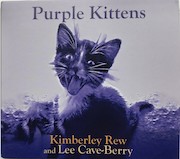
|
KIMBERLEY
REW AND LEE CAVE BERRY – PURPLE KITTENS.
Available
on CD from www.kimberleyrew.com
Purple
Kittens is the new album from husband and wife
team Kimberley Rew and Lee Cave Berry. The
couple have previously released three albums
starting in 2018 with ‘Lend Me Your Comb’. This
one follows on from ‘Enjoy The Rest Of Your Day’
released in 2019. Kimberley will be familiar to
readers of Terrascope through his incendiary
fretwork for The Soft Boys and probably never
needs to work again after penning the hugely
successful song Walking On Sunshine, a song
which has enabled Kimberley the freedom to do as
he pleases. They are joined by Liam Gray – drums
and by Myke Clifford adding some flute to Wrong
Song and by Ranjan Vasudevan playing Carnatic
guitar on I Can Be Any Woman.
It
opens with ‘Penny The Ragman’ the title refers
to Kim’s cousin Penny who looked after the
uniforms for a side of Morris dancers and was a
mainstay of the local Women’s Institute, it also
features one of those lovely unhinged electric
guitar solos from Kim where he seems to grab a
handful of strings and create magi . ‘You Can
Rely On Me’ where Kimberley’s very distinctive
Cambridge sounding narrative vocals are
displayed, it also features some mad tom tom
playing, inspired by Santana’s performance at
Woodstock. Lee gets to sing her own song ‘I Can
Be Any Women’ which name checks some of the
great women from history, like Eve and Helen Of
Troy, it also features some fine exotic carnatic
guitar from Ranjan. Next up is a great cover of
the Soft Boys classic ‘Kingdom Of Love’, it
works a treat, one of Robyn Hitchcock’s finest
from when he seemed to populate all of his songs
with sea creatures, it has the memorable lines
‘I would ramble all through time and space, just
for a butcher’s at your face, you’re the one I
love or so it seems, because you’ve confiscated
all my dreams, yeah!’ It also features a great
Kim solo where he seemingly mashes together a
bunch of random strings and comes up with an ace
solo. ‘Too Much Love’ is a song written on the
road on the Isle Of Wight, it’s a folky song
well placed on the record after the onslaught of
Kingdom Of Love.
‘Wrong
Song’ is a humorous song with some excellent
flute playing from guest Myke Clifford and
another majestic solo coaxed from his guitar by
Kim ‘Unsatisfactory Cats’ is another song sung
and written by Lee, it concerns cats which are
well unsatisfactory, refusing to perform when
gusts come round or deciding to sleep all day.
‘Black Ribbon’ is inspired by Roger Smith who
was a member of Cambridge band Jack, along with
Kim and Lee. Roger sadly died of Covid in 2020
and this song was written by his grandsons.
‘Raspberry ripple Ice Cream’ is another of those
quirky songs Kimberley writes like ‘Purple And
Orange Stripes’, this is Kim’s attempt to write
a song in the mould of ‘Tequila’ with an
electifrying single chord solo on the electric
and a nice bass solo from Lee. ‘Growing Up’ a
nice simple folky song with Liam playing a
Cajon, it’s about being an old fart in these
virtual modern times. ‘Voyager’
is a song written about Voyager which set out
from Earth in 1977. The album ends with ‘Daytime
Night Time’ Kim’s attempt to write a song so
universal that no one could possibly object to,
it starts off with his birth, school days then
off to work then finally reflecting on it all
and wondering what it’s all about. Kim also gets
to play a lovely long guitar solo, straight out
of the fifties with shades of Chuck Berry.
(Andrew
Young)
|
|
|

|
MARK
AND THE CLOUDS –
WAVES
Gare
Du Nord Records
CD/DL markandtheclouds.bandcamp.com
Mark
& the Clouds are a London based band
consisting of Marco Magnani vocals, guitar,
harmonica and keyboards plus drummer Shin
Okajiima and John O’Sullivan on bass, keyboards,
pedal steel and backing vocals. This is their
third album after releasing a couple on the Mega
Dodo label.
Marco
may be familiar to Terrascope readers as being a
member of The Crazy world Of Arthur Brown. This
record has barely been out of the car stereo
since receiving it, I just don’t see the point
of playing anything else at the moment as it is
very good indeed. For pointers think The
Beatles, The Who and other sixties bands like
Andwella’s Dream and The Zombies. Catchy 60’s
inspired psych inflected pop songs with a few
modern touches.
Opener
‘You and me in Space’ sets out their stall early
with a great harmony infused, swirling
psychedelically inclined rock song. ‘Back In
Time’ is an extremely Beatles sounding song or
maybe more like Wings, either way Marco is way
more McCartney than Lennon. ‘You Wanna Put Me
Down’, is a great little pop rocker, some great
harmonies and searing electric guitar hooks.
‘Winter Song’ is a folky, progressive song which
features some suitably wintery violin played by
Maya Kasparova. I love this tune; it’s very
English and pastoral in nature, with its refrain
of ‘breathing the silver mist in my lungs’. ‘All
These Plans’, is another terrific song. At
points on the album a few modern groups like The
Coral are invoked and this one has brass parps
ala ‘Reward’ by The Teardrop Explodes. ‘Free Me
Now’, a stormy sea song features some lovely
slide guitar and wouldn’t be out of place on an
album by say Barclay James Harvest or some such
harmony infused progressive band, it also has a
couple of nice barely controlled electric guitar
solos. I do like this album a lot. ‘No One Makes
A Sound’ is more 70’s in feel, like some of
those glammy bands like early Sweet; it also has
a cool twin guitar section. The vocal harmonies
are very strong indeed.
‘The
Same Old Dream’ has more classic harmony vocals
on which the trio are joined by DJ Marrs Bonfire
and Rachel Kashi. ‘Waves’ is an impossibly light
confection, the whole world in a grain of sand
with hints of Beach Boys particularly the
harmonies. ‘Promised Land’ is pretty apt for
these current times, a dreaming of an escape to
the country, a search for utopia with some fine
pedal steel played by John O’Sullivan and more
brass interjections. ‘Peace Not Religion’ is so
catchy and quite simply brilliant. A truly great
pop rock song, which I dare you not to sing
along to after hearing a couple of times. ‘Miles
And Miles Away’, channels classic Who, ‘Heavy
Drops Of Rain’ sees more parping brass and has a
truly great sixties sound. ‘In The Big Crowd’ is
a little more acoustic in nature and features
some twelve string guitar. This excellent record
closes out with ‘Somebody Else’ a Surferdelic,
psych rocker, which again is stacked chock full
of terrific harmony vocals, over which Marco
gets to play some Mosrite licks ala Peter Gunn.
File under joyful and life affirming.
(Andrew
Young)
|
|
|

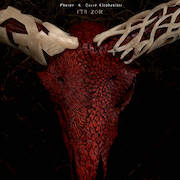
|
BELD
– BEHEADING THE HECKLER (Cassette
on Misophonia
Records)
PHURPA
& QUEEN ELEPHANTINE – ITA ZOR (Cassette
on Misophonia
Records)
The
ever eclectic Misophonia label has been busy
once again with its varied array of old school
cassette releases. As the label says itself
there are no genres or boundaries to restrict
its output so stick around and something you
like will come along soon. Well here’s two
things I like very much.
The
pre-history of Ottawa’s The Band Whose Name Is A
Symbol (TBWNIAS) includes many musical
adventures which cave paintings and folklore
don’t really tell us enough about so this
cassette release is an important addition to the
story of a cornerstone of the Ottowa psychedelic
rock scene. Beld are an important part of the
family tree, deserving recognition in their own
right for their sound adventures as well as
being a key moment in the journey towards
TBWNIAS. John Westhaver, Dave Reford, Carol Lane
and Doug Watson comprise a four piece that
played improvised, experimental cosmic jams for
a two year period in the late 1990s. Although
there are moments when the rhythm becomes more
driving and the guitars crank up, it’s a sound
less heavy than TBWNIAS focusing more on
electronic colours, drones, percussive textures
and light and shade but you can clearly hear
elements of the musical DNA of TBWNIAS coming
together in a vivid and engaging way. The music
on ‘Beheading The Heckler’ dates from a 1997
session at John Westhaver’s record emporium and
all round musical shrine Birdman Sound in
Ottawa. There
are apparently hundreds of hours of improvised
music by Beld recorded during their two year
existence and what we have here is a very tasty
appetiser for what might hopefully be a deeper
archaeological dig in due course. It’s a rough
and often raw voyage of discovery where frazzled
and distorted kosmische soundworlds,
experimental post punk infused electronics and
driving motorik inspired space rock come
together in improvised wanderings that capture
many moods and atmospheres from off kilter
waltzes in space to hazy noir meditations and
journeys to forbidden planets. There are some
really inventive and indeed occasionally
gorgeous moments to be heard and Beld clearly
had their own way with a jam and how to make you
sit up, or quite often sit back and listen.
I
first encountered Moscow based Phurpa at the
Huddersfield Contemporary Music Festival in a
freezing cold church in November - they played
for over two hours with their set slated to be
much shorter than that. It was a night of
hypnotic, intense and otherworldly sounds
centred on their astonishing throat singing
techniques which generate cavernous guttural
chants and drones based on ancient Tibetan
shamanic Bon music rituals. Anyone who was there
will remember it as an incredible transfixing
performance in addition to the discomfort of
church seats for two hours and possibly the late
bus or train home that they missed due to
hanging on to see the end. On ‘Ita Zor’ Phurpa
collaborate with Queen Elephantine, a group
originally from Hong Kong and now based in
Philadelphia. Phurpa
as expected create cavernous waves of devotional
vocal drones over 50 minutes like an acapella
Sunn O))) which somehow manages to be an almost
crushingly intense and yet deeply meditative
ritualistic experience at once. Queen
Elephantine use their experimental and
improvisational skills wisely by not seeking to
challenge the scale and depth of the Phurpa
sound but instead to gently wrap it in a blanket
of often minimal clanking, chiming and
skittering percussion, subtle and moody
electronic textures and various flute, conch
shell and horn colourings that accentuate
devotional moods and intensify the otherworldly
ancient atmosphere. Occasionally faint rhythms
appear and fade away but it’s generally a loose
array of improvised sounds interacting with the
unstoppable weight of the vocal drone. It’s an
incredibly dramatic, hypnotic and absolutely
addictive sound that marries intense ritual with
freely improvised sound elements wonderfully
well and could just be the strangest thing
you’ll listen to this year but you’ll be so glad
you did.
(Francis Comyn)
|
|
|
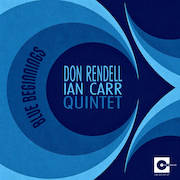
|
DON
RENDELL IAN CARR QUINTET – BLUE BEGINNINGS
(LP/CD/Digital on Jazz
in Britain Records)
Jazz in Britain continues to unearth one
treasure after another, this latest from the Don
Rendell Ian Carr Quintet.
The majority of the record comes from a
November 1964 appearance on the BBC Light
Programme’s It’s Jazz show, and sounds
as fresh as the day it was recorded.
The band was promoting its fine LP
‘Shades of Blue,’ then soon to be released on
Columbia Records.
Tenor and soprano sax man Rendell had
been in the business since the 1940s, and
started his first group in the mid-1950s.
He’d played with Stan Kenton, Billie
Holiday and Woody Herman among others, and was
influenced by Lester Young and John Coltrane.
Like many jazz bands, the lineup was a
revolving door over the years, and this snapshot
was a gem. In
a strong combination of experience and youth,
besides Rendell, it featured phenomenal trumpet
player Ian Carr, who’d deservedly earned his way
into co-billing in the group’s name and affairs;
Colin Purbrook on piano, Trevor Tomkins on
drums, and young Dave Green on bass.
It isn’t absolute audiophile recording
quality, because like all Jazz in Britain
releases, it comes from somebody’s personal tape
collection, in this case Neil Ardley, who penned
the studio record ‘Shades of Blue’s title piece,
included here. (For
another impressive Jazz in Britain release,
check out Ardley’s sparkling live ‘Kaleidoscope
of Rainbows.’). In any event, the tapes are
dusted off and cleaned up quite admirably.
It's easy to see the outsized influence
Miles Davis had over the outfit, and indeed all
of jazz, at the time, especially his 1959
masterpiece ‘Kind of Blue.’
Besides this album’s title Blue
Beginnings and the album they were plugging
‘Shades of Blue,’ songs include the Shades of
Blue title track, plus “Blue Doom” and “Latin
Blue.” And
that’s just the titles.
But they were far from copyists of their
favorite influences from across the pond.
This band swings to its own beat and the
results speak enthusiastically for themselves.
The performances are picture perfect.
You are immediately transported back into
jazz’s golden age with a team of expert guides
on your journey.
Bursting from the gate, “Blue Doom”
doesn’t sound anything like the growly
tongue-pierced metal head music its name might
suggest. Instead,
it’s a compact, head nodding, toe-tapping
perfect intro to Rendell, Carr and crew’s many
talents, where everyone gets to shine.
Rendell’s catchy “Garrison ‘64” sounds
like a perfect soundtrack to 60s swinging
London, with Rendell’s and Carr’s horn blend
leading the way to rewarding solos by all,
highlighted by Colin Purbrook on piano.
At seven minutes, it’s by far the longest
track on the album – indeed, conciseness rules
the day here. Covers
of mellow standards such as “Autumn Leaves” and
“You’ll Never Know” are executed with a gentle
touch and natural grace.
Ardley’s moody ‘Shades of Blue’ wears
its Miles proudly on its sleeve, and you won’t
find any complaints here, with Carr brilliantly
displaying his light and shade.
On “Sailin,’” recorded at an earlier 1964
session, if you listen closely you can hear one
of them snapping his fingers to the groove, and
it’s hard not to empathize.
Closing with Carr’s up-tempo “Big City
Strut,” Purbrook, Carr and Rendell all take
turns on the breaks, and it’s a joy to take in.
Jazz in Britain has put out some
exceptional releases, but they’ve really outdone
themselves here.
Blue Beginnings is an ideal collection of
short (for jazz), sharp shiny pearls, both
compositionally and technically, encased in 1964
amber, from superb performers.
And if I’ve learned one thing from
following this label, there’s even more
greatness coming.
(Mark
Feingold)
|
|
|
 |
GNOD
- EASY TO BUILD HARD TO DESTROY
(ALL FORMATS from Rocket Recordings)
What,
already? It seems like only yesterday that we
all frothed excitedly about the new outcrop of
experimental acts, crudely lumped together as
“new psych”. Yet here we are, pouring over a
staging- post retrospective befitting one such
outfit that has truly weathered the test of time
- can it really be fourteen years? Now that’s a
double itch we think worth scratching, for
Terrascope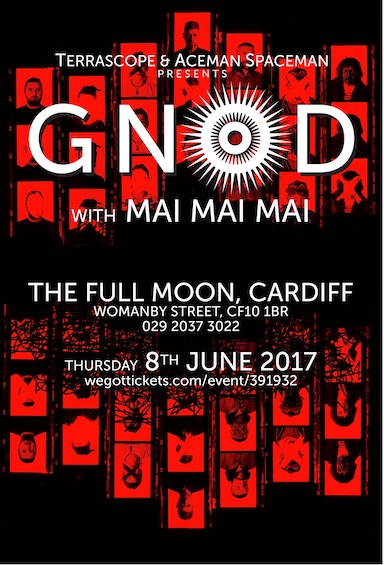 likes Gnod. Well enough, in fact, to have hosted
them on the postage
stamp stage at The Moon, Cardiff in 2017, an
occasion hijacked by a General Election; almost
sunk by a thunderstorm of biblical proportions
and memorable for delicious home-made curries,
prepped and served in conditions that would have
been considered grim even
by the standards of WW1 trenches. Still, nobody
died and, with a favourable wind, I can still
pick up that incendiary performance in my good
ear, that’s how indelibly loud it was.
likes Gnod. Well enough, in fact, to have hosted
them on the postage
stamp stage at The Moon, Cardiff in 2017, an
occasion hijacked by a General Election; almost
sunk by a thunderstorm of biblical proportions
and memorable for delicious home-made curries,
prepped and served in conditions that would have
been considered grim even
by the standards of WW1 trenches. Still, nobody
died and, with a favourable wind, I can still
pick up that incendiary performance in my good
ear, that’s how indelibly loud it was.
Typically, the now dispersed Islington Mill collective’s idea of a
compilation eschews the more obvious cuts with
which, let’s face it, fans will already be
familiar, and instead homes in on a collection
of obscurities
and never-before released material. Trading on
repetition and metronomic, perpetual motion, Easy
To Build... is neither overtly
experimental nor is it possessed, for the most
part, of the bludgeoning intensity with which
Gnod have often been associated. If not exactly
striking a happy medium between the two, it at
least glowers warningly both right and left. As
befits the band’s early DIY ethic, some of this
sounds like it was recorded in someone’s sock
drawer in the next street, with the vocals
relayed via a cardboard tube attached to a piece
of string. No matter, therein lies its period
charm and intoxicating atmospheric appeal.
Astute and occasionally liberal use of brass and
wind instruments (largely missing from more
recent recordings) permeates here, most notably
on the invocative ‘Deadbeatdisco Pt 1’, which in
its ecstatic throes sounds like horns blaring at
dawn over the Ganges. ‘Inner Z’ has the chopping
insistence and rippling synths reminiscent of
Death In Vegas’ pleasing body twitcher,
‘Flying’. Conversely, ‘They Live’ offers the
first real glimpse of grit in the eye, a densely
dirty, pungent psych-rocker that might even
tickle the synapses of anyone partial to early
Wooden Shjips, while the dub inflected
near-eastern doom of, ‘5th Sun’ and
stoned immaculate ‘A Very Special Request’ has
your reviewer nodding rapt and contented, like
some slack-jawed, dopey car dog ornament. Oh
yes. All of which builds up nicely to the
aforementioned ‘Deadbeatdisco Pt 1’ and the
savage, foot-stomp battering of ‘Pt 2’, which
reveals Gnod at their most primal. Head duly
blown, it’s left to the droning incantation of
‘Frostbite’ to bring me whimpering back to earth
and the safety of the scribe’s Veal Crate.
Unlikely to win too many converts from among the Snifferati, who will
most probably still wonder what the fuss is
about, for the initiated - and hopefully a good
few passing strangers - this is one heavy and
affirmative spreading of astral jam for to
savour. It’s certainly a most welcome addition,
nay addiction, to the canon, which is pretty
much what I felt like I’d been fired from,
without realising when it was someone lit the
match. Fourteen more years is too much to
reasonably expect of anyone. Still, I’ve studied
the declaration of feudal indenture that passes
for a job description here in the dank dungeons
of Terrascope Towers and there’s no mention of
reasonable, anywhere.
Furthur.
(Ian
Fraser)
|
|
|
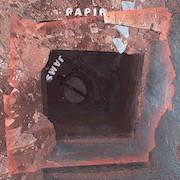 |
PAPIR
- JAMS
(LP/Digital
on Stickman
Records)
In
Papir’s seventh album 'Jams',
the Copenhagen-based instrumental trio adds
another stunner to their
considerable catalogue.
Nicklas Sorensen
(guitar, keyboards), Christian Becher Clausen
(bass, keyboards) and Christoffer
Brochmann Christensen (drums) went into The
Black Tornado Studio in early 2020
and laid down these six dense tracks.
Their style is psychedelic, with
krautrock influence.
And don’t be put off by the fact that
most
browsers seem to say “did you mean Paper
Jams?” when you type it in.
For
those of you who may be
hesitant to dip your toes in a record composed
entirely of jams – and a double
LP at that - fearful of formless, disorganized,
and prolonged noodling of the
highest order, let me put your fears to rest
straightaway. First
of all, Papir has always had jamming on
its albums, but this time they decided to make
the jamming the alpha to omega
of the record. And
as one might expect,
there was still plenty of editing and generally
cleaning up of the tracks to
put a shiny bow on top.
And as for the
music? This
is incredible stuff.
Simply
stated, this is some of
the most deeply psychedelically satisfying music
these ears have had the
pleasure of hearing.
Nicklas Sorensen’s
guitar playing leading the way is positively
trance-inducing.
He goes for the feeling as opposed to
shredding; his style, guitar tones and effects
are a dizzy, swirling, colorful mandala
of sound, sometimes strobing and pulsing, while
other times just flowing
leisurely downstream.
It’s a good thing
Clausen’s and Christensen’s bass and drums are
there to assuredly anchor you somewhat
to earth with both melody and rhythm, because
left untethered, Sorensen’s
guitar will have you drifting far, far away to
both distant outer and inner
space.
The
whole thing was recorded in
sessions over two days.
In typical Papir
fashion, the song titles are everything the
actual music isn’t – bland and
nondescript. So
Track 1, otherwise known
as “17.01.2020 #1,” sets the mood right off with
Sorensen’s guitar spinning,
weaving and funneling you into mesmerized jelly.
And the rest of it really just continues
the
experience from there.
The term “blows
your mind” might sound hackneyed, but in this
case, that’s exactly what Papir
does.
Towards
the latter part, “20.01.20
#2” turns us briefly into ambient music
territory, not a bad thing, while long finale
“20.01.20 #3” starts by veering slightly more
towards rock than its
brain-frying predecessors, has other moments
reminiscent of William Tyler, then
goes into a space drone, but doesn’t always fill
in the phrases with interest.
It’s a minor blemish on what’s otherwise
a fine
work of excellence.
On
the whole, Jams takes you
deep into a psychedelic zone, and its length
allows you to stay awhile and let
your mind absorb and explore it.
Recommended.
(Mark
Feingold)
|
|
|
|
|
|
|
|
|
|
 |
|

